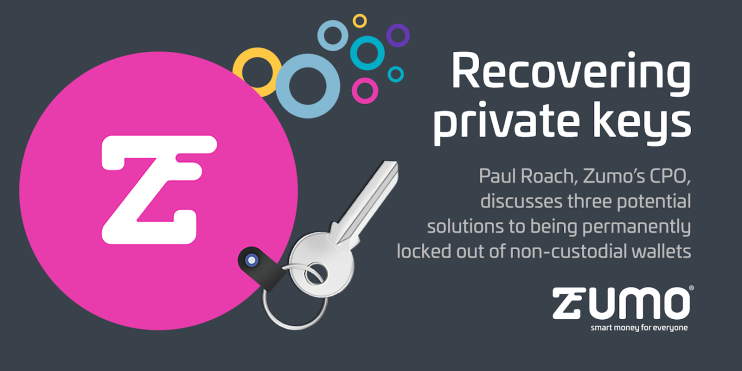Non-Custodial Wallet lockout? Three Solutions

At Zumo we believe that only you should be in charge of your money. Nearly everyone keeps their money in a bank account, and you may think that this keeps it safe, secure, and under your control. But the truth is, it is the bank, and ultimately the government, who decide if and when you are allowed to access your funds.
With our technology your cryptocurrency is stored securely on the blockchain, not in a bank or centralised vault. This means your assets are completely owned by you, and as long as you have your private “keys” stored safely, only you have access to your digital cash.
When you set up a non-custodial wallet, like Zumo, you generate what’s called a public and private key to manage your funds. Typically, the private key is represented by a Seed Phrase
which is a series of randomly generated words unique to your wallet. Non-custodial wallets like Zumo don’t have access to your private keys, so it is essential that you securely record your seed phrase.
If you ever need to recover your wallet or move access to your funds to a different non-custodial wallet provider you can use the seed phrase that was generated with your account to regain access to it. However, if you lose access to your seed phrase it could have disastrous consequences, because unlike other passwords you might forget, you can’t reset a seed phrase.
It’s in everyone’s best interest to find a more robust solution, rather than just relying on seed phrases to manage private keys. There are three potential solutions to seed phrases, each with their own advantages and disadvantages.
Multisignature (often referred to as multisig) refers to requiring more than one key to authorise a Bitcoin transaction. This essentially divides up responsibility for access to tokens, reducing risk. The downside of this approach is it’s quite inefficient, and it doesn’t really solve the issue of complexity for users.
Threshold signatures are essentially an evolution of the multi-signature approach. This allows multiple parties to authenticate transaction signatures without involving consistent fixed private keys. An upside of threshold signatures is that private keys can be sharded (split into multiple fragments and distributed) therefore further minimising the risk of a hack. So, it becomes a more efficient solution but still requires a layer of user interface to make it accessible.
Social recovery relies on elements of threshold signatures but also provides a user interface layer that helps to make it easy to use. With social recovery, private keys are divided amongst
nominated 3rd parties (which can be other people, devices, or even events). When recovery is required, a set number of the nominated parties can unlock and recover the user’s access. This is still a complex technical solution but is more familiar to most users already and so we think it’s the right solution for us to use at Zumo.
At Zumo our goal is to provide everyone with a secure and user-friendly platform to access, manage, and spend cryptocurrency alongside their traditional money. Bridging the gap between the old financial system and the new, bringing financial power back into the hands of the people is what we are all about.
Paul Roach, Co-Founder & Chief Product Officer at Zumo.
LinkedIn http://linkedin.com/in/paulroach23
For further information visit https://www.zumo.money
Crypto AM: Technically Speaking in association with Zumo
